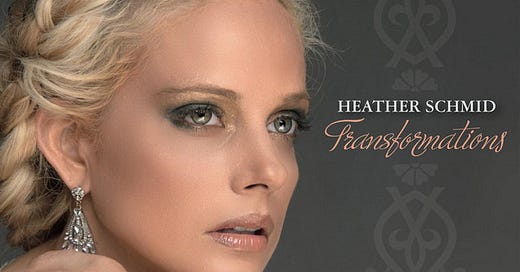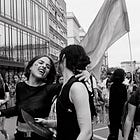Musician Interview with Heather Schmid About Transformations
"I am changed forever because of dramatically positive and dramatically difficult struggles that I faced and I hope I am strong and better because of it."
This interview was originally published in 2016. We shouldn’t assume the musician’s thoughts are still the same but it’s a great time capsule of thoughts about music as healing.
Heather Schmid is a classically trained opera and pop singer who has worked around the globe as not only a singer but also a television host, philanthropist, and spokesperson. She is a Grammy recording artist. Furthermore, she was part of an 8-episode docuseries called Rhythm and Raga.
Transformations Album
I originally did this musician interview when Heather had just released her album named Transformations. It serves a beautiful reflection on the previous three years of her life, which she spent touring in Pakistan.
“The songs highlight the heart-stopping experiences, true grace, life, death, and humanity as she promoted world unity throughout Pakistan. The lyrics on the album were written by Pakistani legend Anwaar Magsood and the melody by Ashaad Mehmood. Phelay Hum Pakistani Hay fused the American pop rhythms with Pakistani regional instruments and local musician melodies. … Heather is a new-breed, millennial performer. Within our extant global community, Heather envisions her music as the bridge that can span cultural differences and connect people in their over-arching sameness.”
What does Transformation mean to you?
Transformation to me equals change so dramatic that you are never again the same. I think of Life as never being the same after a transformation. To me, transformation is growth. Therefore, I named this album Transformations.
After the past three years, I was transformed. I will never be the same person. I am changed forever because of dramatically positive and dramatically difficult struggles that I faced and I hope I am strong and better because of it.
How did you come to spend the past 3 years in Pakistan?
When I was a sophomore at Boston University as a music student, I went to Kenmore Square to learn how to meditate in a hotel conference room. As it turns out, on this night there was only one other person who also wanted to learn how to meditate. That was Rafay, and he was originally from Pakistan. Rafay and I are soul mates that traveled thousands of miles together and plan to travel thousands more. We got married in Pakistan among all of our relatives. I have traveled there ever since. Three years ago we decided to create a Unity Project in Pakistan to talk about Unity and celebrate the positive aspects of the nation. It was our hope to reignite a peaceful dialogue between our two nations.
Amazing! What is one stand out experience in Pakistan that has affected you?
There were moments in Pakistan that were quite harrowing, but that is never what I focus on. I remember the deeply rewarding positive interactions with everyday Pakistanis. Finishing the Unity song, performing in Pakistan, meeting and hearing the positive responses to the music is the greatest, most rewarding thing of my music career.
After the Unity song was released and become popular on the radio, TV and social media, I started to hear from people on the streets of Pakistan. Many talked about how the song was meaningful to them and how much it meant that in the middle of such negative press about their country, this was something that they could feel proud of. I was in a hotel lobby when a few medical school students eloquently expressed their reaction to the song. They detailed their feelings of despair with the current environment in Pakistan, how dangerous it was because of terrorism. Students credited the song with helping to ease their feelings of helplessness and shame.
What global issues are of most concern for you personally?
Access to Education is a very important issue to me. I mean… I can’t solve the world’s problems but I can help with education. In Pakistan, I see firsthand how lack of education perpetuates poverty. Kids that cannot read street signs are taken advantage of. Parents without enough education take their children out of school to help feed the family. Education is a pathway for a better life for generations. Even for me, educated myself about the cycle of poverty provides a much deeper understanding and hopefully keeps me from perpetuating subconscious biases. But nobody wants to hear from a singer how she “educated myself out of my biases” blah blah blah… I was never the popular girl I will tell you that!
You were educated in music through Boston University. How has your classical training at BU influenced your career?
Classical Training means freedom and autonomy to me. I never had to rely on a producer to arrange a track for me. I could read music, write and arrange parts and open up pro-tools session and do it myself. If I had a great musical idea, I could write it down and arrange the parts mentally and sketch out the idea to see if it was any good.
Furthermore, I could sing any style of music because I had the classical training which provides a solid foundation vocally. Because I trained my voice for so long, I have the range to sing any part. I never had to wait for a song to come along that I could sing on. I never had to beg a producer to work with me. As an artist, when inspiration strikes, you want to be able to fulfill your musical vision. That is all possible with my classical training.
In China, I learned and wrote music in Mandarin because of the language-learning in opera school. When I was asked to perform and sing with an orchestra, we spoke the same language. Rhythms, beats, measures, and notes were our universal language.
The other thing is, I own all of my own music. If I could not write, produce and arrange, which I learned from my classical training, I would be at the mercy of the owner of the tracks.
You also had a TV show in China, right? How does your TV show influence or tie in with your work as a musician?
The Ambassador was a show on CCTV in China. It followed my live shows, meeting locals, exploring the fun local tourist spots, also the charity that each show benefited. It was so friggin’ cool. I loved every minute of my touring life in China. It was basically a travel show, combined with a reality show, combined with my life as a touring artist. I learned how, as the only American in a region, you become a Music Diplomat almost by accident. It definitely seemed like local people were judging my actions to form their opinions about all Americans. I learned I better watch what I say! I definitely learned about music diplomacy through this show. It is what influenced The Unity Project in Pakistan.
What is your favorite song off Transformations?
Journey. That cello line seduced me. I am the snake with swirls in my eyes slowly uncoiling from the charmer’s wicker basket with that cello line. I’m done. The lyrics are brutally honest. I feel my own relentless anxiety fade away into peace through that song. It’s like a therapy session. Then I go back into my wicker basket and say “what just happened?”
What is the process of working with Anwaar Maqsood and Ashaad Mehmood on these songs?
Working with Anwaar Maqsood and Ashaad Mehmood was like being in the presence of greatness and just trying to soak it all in. They call Anwaar Maqsood the Shakespeare of Pakistan because he is such a legend. He is brilliant and smart and hilarious all at the same time. He has produced TV shows, songs, movie scripts, poetry for more than 40 years in Pakistan the whole time poking fun of the government in a smart articulate way.
It is no easy task to be an artist in Pakistan. There is virtually no support for artists in the nation. In a country with a history of martial law, military takeovers, widespread corruption, and terrorism; artists struggle on every level. Their forward-thinking mindset is welcome and persecuted at the same time. How can anyone think of inspiring, articulate, creative phrasing when they are worried about road closures and whether their family is safe? Ashaad Mehmood runs the only Cultural Arts School in the whole country. The stories they told as artists in Pakistan were inspirational, difficult to hear, and deeply moving all at the same time.
So powerful! What do you hope listeners will take away from the album?
Transformations is about connection … higher connection, universal connection, ancestral connection, spiritual connection. I hope the words, struggles, and resolutions are universal. It is what helped me recover from failure, struggle, and disappointment. I hope we make a connection through the music.
If you read this far, perhaps you liked the work. The work does take work. It only continues with support, so please consider subscribing. My annual rate starts at $10 per year.








